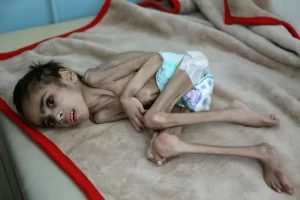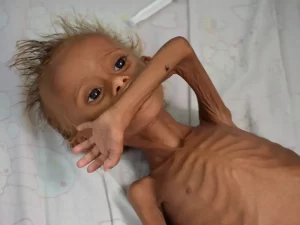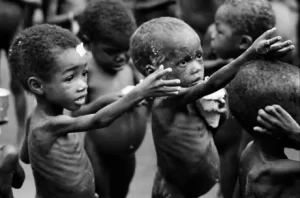“All sorrows are less with bread.” -Miguel de Cervantes (Don Quixote) Spanish writer
________
Nowadays in many parts of the world we live in an environment overwhelmingly abundant with foods of all kinds.
All that we have to do is to go to any supermarkets, food shops or open markets to be overwhelmed by the vast range of foods selections that are on sale, from the locally produced to those of faraway countries.
We can say that food wise we are spoilt for choice. Never in the history there has been such an abundance and variety of foods to choose from. On the contrary, hunger and famine were a recurrent tragedy during many historical periods everywhere in the world and billions of people died of starvation or malnutrition all the time because of it.
We also have the ubiquitous TV celebrity chefs entertaining viewers on TV all the time with shows about foods and recipes from the useful to the extravagant; streams of internet cookery videos; countless books on foods and world cuisines; a profusion of diets and nutrition books and videos that inform or entertain us about every aspect of food, cooking and nourishment.
On the surface such a bewildering abundance of foods, that more or less are affordable by most, with an astonishing number of culinary and nutritional information seem a very good thing that all past generations could only dream of. An ideal culinary situation thanks to the developments of agricultural science, food storing technology and the ever present populist media.
Yet such a staggering abundance has created lots of problems.
Hosts of food related diseases, some of which were unknown or hardly noticeable when food was hard to get or scarce have come out of the Pandora box.
Obesity, anorexia, bulimia, orthorexia that is, the obsession with eating foods that are considered or marketed healthy and avoidance of foodstuffs that are even minimally suspected or claimed to be unhealthy; diabetes, liver diseases, addiction to junk foods etcetera have become a permanent feature of the medical panorama of alimentary illnesses that have plagued modern life making many people ill and killing billions of them.
In fact, alimentary diseases are a huge global problem costing billions each year to the national health services of nations where they exist, also making many people lives painful and miserable, or ending their existence prematurely. As one proverbs say on this regard: “There can be two much of a good thing”, while another warns that: “Gluttony kills more than the sword.”
This scenario, however exists only in those parts of the world where the standards of living are wealthy or comfortably well off.
In other parts plagued by poverty caused by corruption, bad political management, exploitation of people, pitifully paid wages for long hours of hard work, mass unemployment, lack of basic benefits, wars, terrorism and other socially destructive factors the situation is totally the reverse.
There are currently over eight hundred and fifty million people living on the starving line, that have nothing or little to eat to sustain themselves and their families. Putting it simply: one person in eight in the world each day goes to bed on an empty stomach; not just for one day, but for weeks, months and years that means that they starve or die of hunger and malnutrition.
Among them there are nearly six million little children under five each year on the brink of starvation and an estimated thirteen million under eighteen in the same dire condition. This means that many of them die of hunger, while other suffer from undernutrition, malnutrition and stunted growth that, if they survive, will affect them for the rest of their lives.
All this happens while in the rest of the affluent, or relatively affluent world, not only there is an overabundance of foods. Moreover, as: “Abundance brings contempt and complacency,” there is also an enormous waste of food thrown away each day.
Statistics say that some 961 million tons of food, most of it still perfectly edible are thrown away each day in the world by the food industry and households.
So why there is such a detrimental situation that is destroying the lives of so many people, especially those of children? Also, why do people throw away so much food without giving a second thought to the hundreds of million fellow human beings who are not so lucky to enjoy a meal each day?
It’s because as the Irish proverb say: “The well fed doesn’t understand the lean.” That is, the well-nourished, doesn’t understand the starving. Also, because in this age of food abundance people take food for granted and since they have never experienced hunger they throw it away without any consideration. If they had, they would respect and cherish it as a blessing and be grateful for it.
So the question is: will this situation of food inequality, where there is too much for some and none for others, continue in the future?
The answer is yes for the poor ones that nowadays can’t afford food.
For the others living in the affluent parts of the world where food is plentiful, I doubt it very much.
With the current destruction and poisoning of the earth natural environment, not far in the future, vast areas of the world, if not everywhere in the world, will most likely experience large scale famine and droughts like they have never been seen in history.
In this regard we should consider a warning of an American Cree Indian prophesy that says: “When the last tree has been cut down, the last fish caught, the last river poisoned, only then we will realize that one cannot eat money.”
Those are words that warn us that money is worthless without a healthy natural world that can sustain life for all its inhabitants.
Therefore, all this said, dear blog reader, when you eat be always grateful for your food, respect it and try not to waste it because tomorrow it may not be in your plate anymore.

“Happiness and joy come to the starving in the shape of bread.” -Pierrot Armanno


Este artículo abre le conciencia de muchos que sabemos lo que sucede en muchos países, de Africa e incluso en Sur America y no se toman acciones para mitigar este mal, la indiferencia de los países primermundistas es increíble; pero como explica Pierrot en su artículo, con tantas opciones alimentarias y buen abastecimiento de los mismos, no dimensionan la catástrofe causada por la escasez de alimentos en estos países de Africa y Latinoamerica.
Sofia says in Spanish:
This article opens the conscience of many of us who know what is happening in many countries, in Africa and even in South America and no actions are taken to mitigate this evil, the indifference of the first world countries is incredible; but as Pierrot explains in his article, with so many food options and a good supply of them, they do not measure the catastrophe caused by food shortages in these countries in Africa and Latin America.
___________
Thanks for your insightful comment Sofia that highlights the apathy and indifference of the affluent, well fed world in solving this shameful human catastrophe.
Quoting Einstein in this regard: “The world will not be destroyed by those who do evil, but by those who watch and do nothing.”
It is indeed shocking, the amount of food we who live in a more well-off part of the world throw away every day. Besides, we have the capacity to produce huge amounts of food, but since it isn’t profitable to give it away for charity, no one even thinks about doing it. I grew up in a family where I was taught to respect food, for my grandparents knew hunger. But I’m not sure people can be taught how it feels not to have enough food if they don’t actually go through such an experience.
Exactly Eve, you hit the nail in the head.
Many people appreciate the value good essential things such as: health, food and shelter when they lose them and often when they do it’s to late.
Can they be taught?
I think so with proper ecological education from an early age such as: taking school children to good farms and food manufacturing firms where they can see and learn how food is made and how much effort and energy it takes to make them.
Unfortunately politicians don’t seem to care, while the moguls of the food industry prefer that people consume as much as possible in order to maximize their profits.
And the saddest thing is that by pushing people to spend more time on social media and the Internet in general, by offering all kinds of fast food with easy delivery at cheaper prices than the fresh local produce, we are taught not to think about how things are made and what can be done to make other people’s lives better.